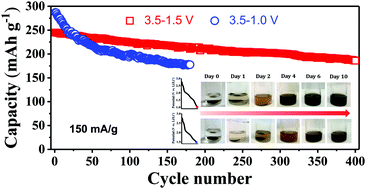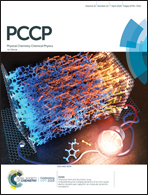Understanding capacity fading of the LiVO3 cathode material by limiting the cutoff voltage
Abstract
The effects of discharge cutoff voltages on the structural evolution and electrochemical performance of the LiVO3 cathode upon cycling are investigated by electrochemical measurements, electrochemical impedance spectroscopy, ex situ X-ray diffraction, Raman spectra, Fourier transform infrared spectroscopy and X-ray photoelectron spectroscopy. It is found that a lower cutoff voltage causes formation and accumulation of unstable V4+ ions on the surface of the electrode, which easily leads to severe structural deterioration and capacity fading. A limited cutoff voltage between 3.5 and 1.5 V can effectively enhance the structural stability and consequently the electrode demonstrates 75.9% capacity retention and neglectable working voltage decay over 400 cycles. The result that the operation voltage range strongly affects the structural stability of cycled LiVO3 provides a new insight into exploring feasible approaches to achieve highly stable LiVO3 and other vanadium-based electrodes for lithium-ion batteries.



 Please wait while we load your content...
Please wait while we load your content...